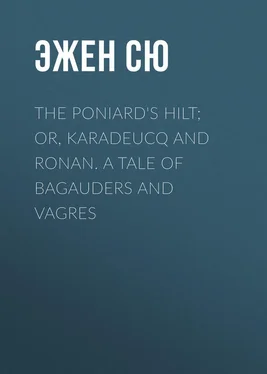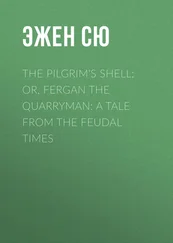Эжен Сю - The Poniard's Hilt; Or, Karadeucq and Ronan. A Tale of Bagauders and Vagres
Здесь есть возможность читать онлайн «Эжен Сю - The Poniard's Hilt; Or, Karadeucq and Ronan. A Tale of Bagauders and Vagres» — ознакомительный отрывок электронной книги совершенно бесплатно, а после прочтения отрывка купить полную версию. В некоторых случаях можно слушать аудио, скачать через торрент в формате fb2 и присутствует краткое содержание. Издательство: Иностранный паблик, Жанр: literature_19, foreign_antique, foreign_prose, на английском языке. Описание произведения, (предисловие) а так же отзывы посетителей доступны на портале библиотеки ЛибКат.
- Название:The Poniard's Hilt; Or, Karadeucq and Ronan. A Tale of Bagauders and Vagres
- Автор:
- Издательство:Иностранный паблик
- Жанр:
- Год:неизвестен
- ISBN:нет данных
- Рейтинг книги:5 / 5. Голосов: 1
-
Избранное:Добавить в избранное
- Отзывы:
-
Ваша оценка:
- 100
- 1
- 2
- 3
- 4
- 5
The Poniard's Hilt; Or, Karadeucq and Ronan. A Tale of Bagauders and Vagres: краткое содержание, описание и аннотация
Предлагаем к чтению аннотацию, описание, краткое содержание или предисловие (зависит от того, что написал сам автор книги «The Poniard's Hilt; Or, Karadeucq and Ronan. A Tale of Bagauders and Vagres»). Если вы не нашли необходимую информацию о книге — напишите в комментариях, мы постараемся отыскать её.
The Poniard's Hilt; Or, Karadeucq and Ronan. A Tale of Bagauders and Vagres — читать онлайн ознакомительный отрывок
Ниже представлен текст книги, разбитый по страницам. Система сохранения места последней прочитанной страницы, позволяет с удобством читать онлайн бесплатно книгу «The Poniard's Hilt; Or, Karadeucq and Ronan. A Tale of Bagauders and Vagres», без необходимости каждый раз заново искать на чём Вы остановились. Поставьте закладку, и сможете в любой момент перейти на страницу, на которой закончили чтение.
Интервал:
Закладка:
"Well said, Ronan! The bishop first!"
"March! I know the house!"
Who was it that said this? A young and handsome Vagre of about twenty-five years of age. He went by the name of "Master of the Hounds." There was no more accurate marksman than he with his bow and arrow. His arrow simply traveled as he wished. Once the forester slave of a Frankish duke, he was caught in an amour with one of the women of his seigneur's household, and escaped death by flight. He thereupon ran the Vagrery.
"I know the episcopal house," repeated the daring fellow. "Feeling it in my bones that some day or other we would be holding communion with the bishop's treasury, like a good master of the hounds, I went one day and took observations around his lair. I saw the dear old man there. Never did I see a buck with blacker or more fiery eyes!"
"And the house, Master of the Hounds, the house; how is it arranged?"
"Bad! The windows are high; the doors heavy; the walls strong."
"Master of the Hounds," replied Ronan the Vagre, "we shall reach the heart of the bishop's house without crossing either the door, the windows or the walls – on the same principle that you reach your sweetheart's heart without penetrating by her eyes – the night is favorable."
"Brothers, to you the treasures – to me the handsome bishopess!"
"Yours, Master of the Hounds, be the bishopess; ours, the booty of the episcopal villa! Long live the Vagrery!"
CHAPTER II
BISHOP AND COUNT
In the summer season Bishop Cautin inhabited a villa situated not far from the city of Clermont, the seat of his episcopacy. Magnificent gardens, crystalline springs, thick arbors, green lawns, excellent meadows, gold harvests, purpled vines, forests well stocked with game, ponds well supplied with fish, excellently equipped stables – such were the surroundings of the holy man's palace. Two hundred ecclesiastical slaves, male and female, cultivated the church's "vineyard," without counting the domestic personnel – the cup-bearer, the cook and his assistants, the butcher, the baker, the superintendent of the bath, the shoemaker, the tailor, the turner, the carpenter, the mason, the master of the hounds, besides the washerwomen and the weavers, most of the latter young, often handsome female slaves. Every evening one of these girls took to Bishop Cautin, who lay softly tucked on a feather bed, a cup of warm and highly spiced wine. Early in the morning another girl took in a cup of creamy milk for the first breakfast of the pious man. And thus lived that good apostle of humility, chastity and poverty!
And who is that portly, handsome and still young woman, who resembles Diana the huntress? With her bare neck and arms, clad in a simple linen tunic and her long black hair half undone, she leans on her elbows over the balcony that crowns the terrace of the villa. At once burning and languishing, the eyes of this woman now rise towards the starry sky, now seem to peer through this mild summer's night, under shelter of which, with the stealthy step of wolves, the Vagres are wending their way towards the bishop's residence. The woman is Fulvia, Cautin's bishopess, whom he married when, still a simple friar, he did not yet aspire to a bishopric. After he was promoted to the higher office that he now fills in the hierarchy, he piously calls her "my sister," agreeable to the canons of the councils.
"Woe is me!" the bishopess was saying. "Woe to these summer nights during which one is left alone to inhale the perfume of the flowers, to listen to the murmur of the nocturnal breezes in the foliage of the trees, murmurs that so much resemble the stolen kisses of lovers! Oh! I always fear the unnerving heat of these summer nights! It penetrates through my whole frame! I am twenty-eight years of age. I am now twelve years, married, and I have counted these conjugal years with my tears! A recluse in the city, a recluse in the country by the orders of my lord and master, my husband, Bishop Cautin, who spends his time in the women's part of the house among my female slaves, whom the profligate debauches while pleading the canons of the councils that, he says, order him to live chastely with his wife – such is my life – my sad life! My youth is ebbing away without my enjoying a single day of love or of freedom. Love! Freedom! Shall I grow old without knowing you? Woe is me!"
And the handsome bishopess rose, shook her black hair to the night breeze, puckered her black eyebrows and cried defiantly:
"Woe to violent and debauched husbands! They hurl women into perdition! Loved, respected, treated, if not as wife, at least truly as his sister by the bishop, I would have remained chaste and gentle. But disdained and humiliated before the lowest of the domestic slaves, I have grown to be wrathful and vindictive. From the height of this terrace, and often my cheeks mantling with shame, I follow with distracted gaze the young slaves of the field when they go out to work in the morning and return in the evening. I have struck my husband's concubines with my hands – and yet, poor wretches that they are, they do not yield to the lover who begs, but to the master who orders. I struck them in anger, not in jealousy. Before that man became odious to me, I was indifferent to him. Nevertheless, I might have loved him, had he wished it – and as he willed. 'Sister-wife' of a bishop – it looked attractive! How much good could not be done! How many tears could not be dried! But I have had only my own to dry, soon finding myself degraded and despised. The measure overflows; I have wept enough; I have moaned enough; I have sufficiently resisted the temptations that devour me! I shall flee from this house, even at the risk of being captured and sold as a slave! Can it be called to live, this dragging of my days in this opulent villa, a gilded grave? No! No! I wish to leave this sepulchre! I wish to breathe the free air! I wish to see the sun! I wish to move free in space! I crave a single day of love and freedom! Oh! If I could only see again the young lad, who more than once went by this terrace early in the morning! What warm and loving glances he shot at me! What a beautiful and fearless face looked from under his red headcover! What a robust and graceful build did not his Gallic blouse reveal with the belt of his hunting knife! He must be some forester slave of the neighborhood! A slave! What does it matter! He is young, handsome, nimble and amorous! My husband's concubines also are slaves! Oh! Shall I never enjoy a day of love, of freedom?"
In the meantime, what is the bishop doing while his bishopess, lost in revery on the balcony over the terrace, contemplates the stars, sighs into the darkness, and breathes her sorrows and her devilish hopes upon the midnight breezes? The holy man is drinking and conferring with Count Neroweg, who happens on this night to be his guest. The banquet hall in which they are seated is built after the Roman fashion. It is a spacious room, ornamented with marble pillars, and decked with gilded work and fresco paintings. Gold and silver vases are ranged on ivory sideboards. The floor is slabbed with rich mosaics that are pleasing to the eye. But still more pleasing to the eye is the large table loaded with drinking cups and half-emptied amphoras. The leudes, Neroweg's companions in arms and his equals in time of peace, have gone to play at dice with the bishop's clerks and familiars in the vestibule, after having partaken of supper at the same table with the count, as is the custom. Here and there along the walls the rough weapons of the leudes are stacked up – wooden bucklers, iron-rimmed staves, 'francisques' or double-edged axes, 'haugons' or demi-pikes furnished with iron grappling hooks. The count's buckler is illumined with a painting that represents three eagle's talons. Left alone at table with his guest, the prelate induces Neroweg to drain cup after cup. At the lower end of the table sits a hermit laborer. He drinks not, neither does he speak. At times he seems to listen to the conversation of the two topers. Oftener, however, he is steeped in thought.
Читать дальшеИнтервал:
Закладка:
Похожие книги на «The Poniard's Hilt; Or, Karadeucq and Ronan. A Tale of Bagauders and Vagres»
Представляем Вашему вниманию похожие книги на «The Poniard's Hilt; Or, Karadeucq and Ronan. A Tale of Bagauders and Vagres» списком для выбора. Мы отобрали схожую по названию и смыслу литературу в надежде предоставить читателям больше вариантов отыскать новые, интересные, ещё непрочитанные произведения.
Обсуждение, отзывы о книге «The Poniard's Hilt; Or, Karadeucq and Ronan. A Tale of Bagauders and Vagres» и просто собственные мнения читателей. Оставьте ваши комментарии, напишите, что Вы думаете о произведении, его смысле или главных героях. Укажите что конкретно понравилось, а что нет, и почему Вы так считаете.











![John Bruce - The Lettsomian Lectures on Diseases and Disorders of the Heart and Arteries in Middle and Advanced Life [1900-1901]](/books/749387/john-bruce-the-lettsomian-lectures-on-diseases-and-disorders-of-the-heart-and-arteries-in-middle-and-advanced-life-1900-1901-thumb.webp)
